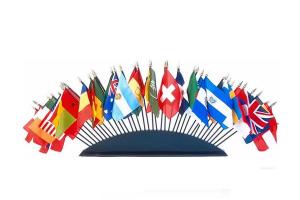Ending Polio in the World
A look at what polio is and its history in six short videos
[6-10 minutes each]

All About Polio
Most British doctors and nurses working today will never have treated a case of polio

Polio mainly affects children under five and can cause rapid paralysis and sometimes death.
Once a worldwide scourge, concentrated vaccination efforts have caused the total number of cases to drop from about 350,000 in 1988 to to just 37 last year, in Afghanistan, Pakistan and Nigeria.
Few people under 45 in the UK will know anything about the devastating effects of this disease and therefore not understand the need to eradicate it completely. These videos take a harrowing look at Polio.
To help a child be protected against Polio costs around £2*
Please help us to save as many children as we can from this awful disease:

What is Polio?
Most British doctors and nurses working today will never have treated a case of polio.
The closest most of us ever come to the polio virus is swallowing a sugarcube containing the oral vaccine or taking our children for their jabs. Today, we stand on the brink of eradicating polio from the world.
Yet for anyone over the age of 45, polio still casts nightmarish
shadows of babies entombed in iron lungs, children hobbling in leg irons
and adults confined in wheelchairs. Seemingly appearing out of nowhere
in unstoppable epidemics, polio killed or paralysed millions, and mostly
affected children. The disease grabbed headlines, stoked panic and
drove massive fundraising campaigns. Doctors and scientists were
powerless to prevent or treat the scourge.
Dr Paul Alexander has been in an iron lung since the age of six! He has endured this for over 60 years and met challenges of the disabling effect of Polio with determination and courage. His story will help to understand what he has gone through ...
Here is a series of videos to revisit all about polio ....
Part 1
Polio survivors share their accounts of what it was like to live through the polio epidemic as children. Historian Dr. Daniel Wilson, author of the book “Polio Voices” leads us through a brief history of polio and its first U.S. outbreaks. An animation shows how the polio virus infects the human body.
Part 2
In 1920, Franklin D. Roosevelt was the shining star of the Democratic Party and a Vice Presidential candidate when he was struck down with Polio. This segment traces FDR’s journey to Warm Springs, Georgia as he desperately tries to find relief from the effects of Polio for himself and others. John Steinhauer talks about his time at the Warm Springs Rehabilitation Center with FDR.
Part 3
Dianne Odell of Jackson, Tennessee has lived in an iron lung longer than anyone alive. She tells the story of the day she fell ill with polio and describes what it’s been like to live her life in an iron lung and why it is the only way for Dianne and others like her to survive.
Part 4
With no cure in sight, scientists and researchers began the race to prevent polio. With FDR’s help the U.S. witnessed the creation of the fundraising powerhouse now known as the March of Dimes to help find a vaccine. In this segment, we take a look back at the brilliant work of Dr. Jonas Salk and Dr. Albert Sabin both credited with discovering two very different, but effective vaccines, as well as the grave mistakes that were made in the rush to stop Polio. The last surviving member of Salk’s dream team shares his perspective.
The World Health Organization has declared Polio conquered in the Western Hemisphere, but Polio has returned to the U.S and still remains a problem worldwide. This segment examines why some parents are not getting their children vaccinated. It also explores a nightmare scenario in which polio reemerges in the U.S.
Part 6
Hear first-hand from Polio survivors who worked hard to regain mobility following their bouts with polio as children only to find that decades later their bodies are beginning to fail. They’re facing a condition known as Post Polio Syndrome. See why Post Polio Syndrome is a growing problem and why its treatment is counterintuitive.
Serious challenges, including violent attacks on health workers by Islamists, poor routine immunisation coverage and rumours the vaccine causes impotence make this a precarious possibility. But if India can do it, why not the world?
Now you are aware of this terrible disease here is how you can be part of the sory of eradicating polio
To leave you with food for thought - There has been a significant drop in the number of cases year on year .. so we need to finish the job ...

*the cost of vaccine has been calculated as an estimated average of the UNICEF prices projected 2019-2022
Contact Martin Brocklebank about this page:
'What We Do' Main Pages:

We welcome people of all ages and backgrounds to join our eClub, to use their time, talents, professional skills and energy to improving the lives of people in their local communities and others around the world.
more
Rotary E-Clubs are just like traditional Rotary clubs in many respects. However, rather than having a set meeting time and place, the club members on the Internet, 24 hours a day, seven days a week and or during our weekly online club meetings
moreScroll down to "catch-up" and watch a weekly speaker recording of your choice.
moreHere are some of our membership videos that run continuously once started ... to play another video stop the one playing and start the new one
more




